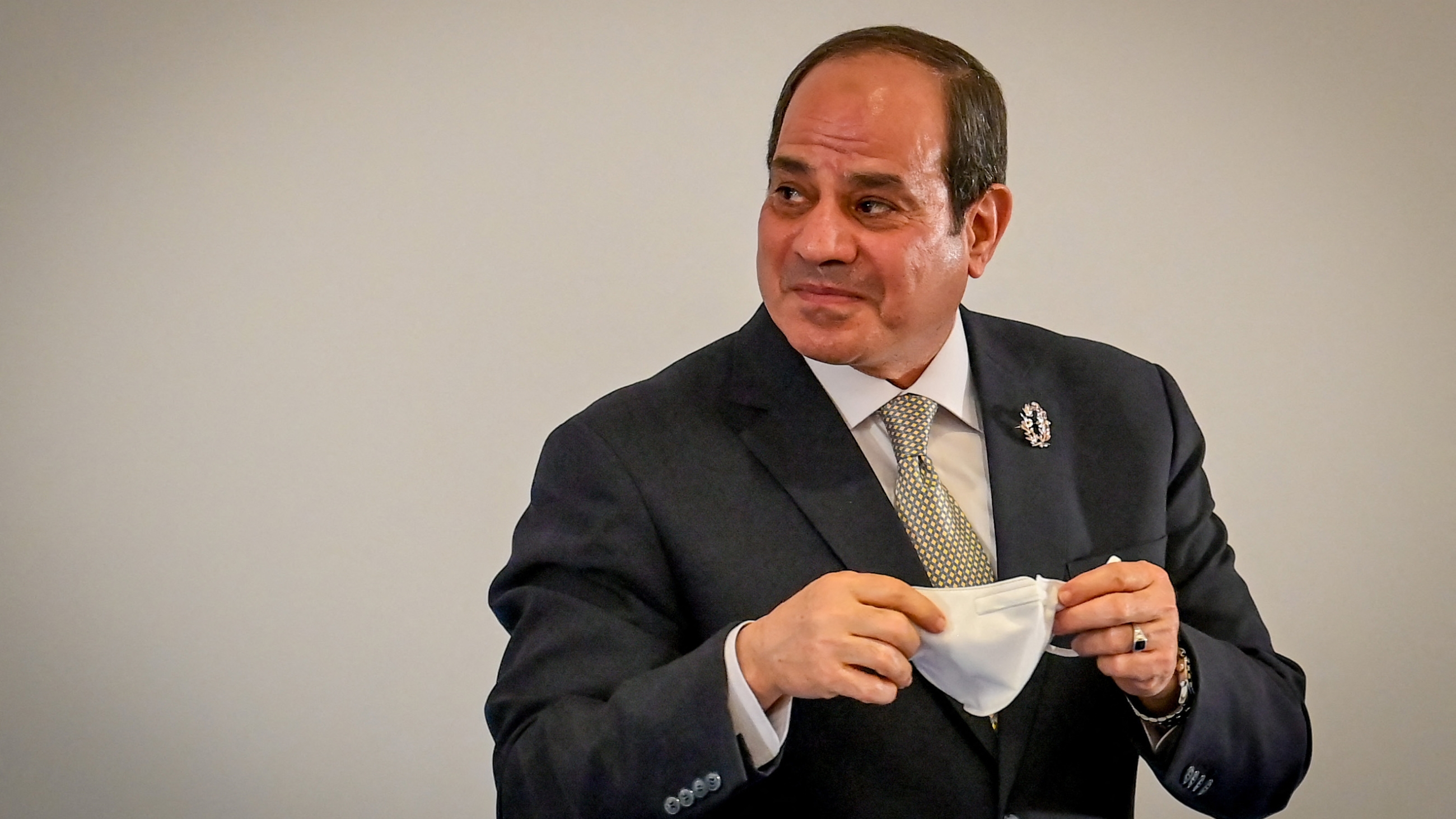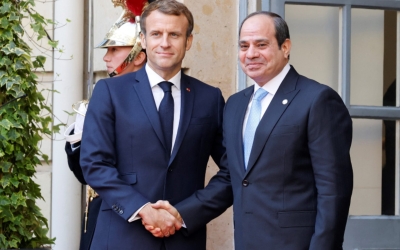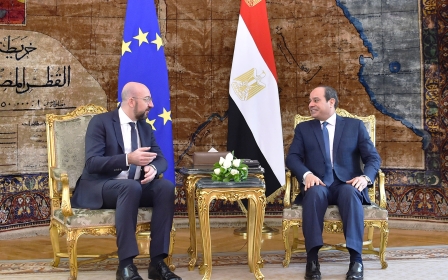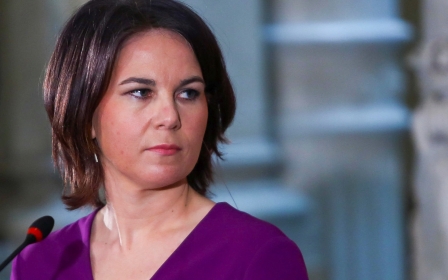Egypt: Greek diplomats worked with Cairo to block EU criticism of Sisi

Egyptian foreign ministry officials worked with Greek diplomats in a bid to remove Egypt from a list of countries criticised by the European Union at the United Nations over human rights abuses, Middle East Eye can reveal.
Greek diplomats tried to persuade other EU members to drop any reference to Egypt in a statement to the UN Human Rights Council in 2017, according to an Egyptian foreign ministry memorandum obtained by MEE.
Failing that, the diplomats pledged to work to dilute EU criticism of Egyptian President Abdel Fattah el-Sisi's rights record, the document says.
The leaked memo raises new questions about support for Egypt within the EU despite widely documented human rights abuses since 2013 under Sisi's rule.
It also comes as the Human Rights Council faces calls from nearly 200 European lawmakers to establish a human rights monitoring mechanism on Egypt during its 49th session that began on 28 February.
New MEE newsletter: Jerusalem Dispatch
Sign up to get the latest insights and analysis on Israel-Palestine, alongside Turkey Unpacked and other MEE newsletters
'Childish moves'
The memo, dated 28 May 2017, was written by officials in the office of incumbent foreign minister Sameh Shoukry.
It describes purported efforts by Greek diplomats in Brussels and Geneva on Egypt's behalf as EU officials were preparing a draft statement ahead of the following month's 35th session of the Human Rights Council.
The statement was due to be read during the Item 4 debate, when UN members and accredited organisations can highlight human rights situations which they believe require the council's attention.
The EU has routinely used Item 4 debates to criticise certain states for their rights record. But the bloc did not submit a statement for the 35th meeting - the first time the EU had failed to do so - after member states could not agree on the wording.
According to the memo: "Greek diplomats reported that they issued instructions to request the complete deletion of the reference to Egypt, yet they realise that this is almost impossible in light of the resistance they encounter from important and influential countries within the EU."
If the efforts to remove Egypt failed, the diplomats would "aim to amend and mitigate the statement as much as possible," it said, noting they would attempt to delete a reference to "extrajudicial killings and enforced disappearances" from the draft.
Noting the EU's repeated criticism of Egypt, Shoukry's office recommended "showing a degree of indifference to these childish moves and our lack of preoccupation with them," according to the memo.
It also recommended limiting Egyptian lobbying of EU members to Greece, Cyprus, Hungary and France "to request their support in deleting the paragraph on Egypt".
Egyptian-Greek relations
+ Show - HideEgypt and Greece have advanced military relations and a joint defence agreement, aided by their geographic proximity. The Medusa drills are the centre of the joint exercises between the two sides. Last year, Egypt participated in Medusa drills with Greece, Cyprus, and the United Arab Emirates.
Egyptian and Greek air forces also took part a training exercise using combat aircraft at a Greek air base in October 2021.
These drills were preceded by Sisi’s visit to the Greek capital, Athens, on 19 October 2021 to participate in the ninth tripartite summit between Egypt, Greece and Cyprus, within the framework of a cooperation mechanism between the three countries that started in 2014.
Egypt and Greece are also working together on a number of energy projects. On 2 February, Mohamed Shaker, Egypt's electricity minister, and Costas Skrekas, Greece's environment and energy minister, held a video call meeting to discuss accelerating the implementation of an electrical interconnection project between the two countries.
Egypt is not currently among the top suppliers of liquified natural gas (LNG) to Greece, exporting just 0.08 million tons in 2021. But the two countries recently agreed to boost cooperation as Greece is attempting to diversify its energy sources.
The Greek energy ministry in November said Egypt and Greece had held talks on extending a Mediterranean subsea pipeline between the two countries to facilitate the transfer of LNG.
Both countries are also members of the Cairo-sponsored Eastern Mediterranean Gas Forum, aligning them against Turkey in the so-called "drilling wars" and maritime border disputes over the exploitation of undersea gas resources in the region.
It remains unclear whether the EU's failure to issue a statement at the 35th session was influenced by disagreements over the bloc's stance towards Egypt.
It was reported at the time that Greece had blocked the statement over its "unconstructive criticism of China".
"Greece's position is that unproductive and in many cases, selective criticism against specific countries does not facilitate the promotion of human rights in these states, nor the development of their relation with the EU," a Greek official told Reuters.
'Extremely concerning'
Claudio Francavilla, EU advocate at Human Rights Watch, told MEE that allegations of Greek-Egyptian efforts to influence the EU's position were "extremely concerning".
Francavilla referred to later Item 4 statements by the EU, in 2020 and 2021, which both begin by recognising Egypt's "key role for regional security and stability, managing migration and efforts to counter terrorism".
"The EU has continued to keep a nearly flattering approach in its formulation of concerns over Egypt's rights record at the UN Human Rights Council, which stands in stark contrast to the firmer language used on other countries in the same statements," Francavilla said.
"Instead of striving to dispense baseless praise, the EU should seriously reconsider its approach to Egypt, unequivocally condemn the human rights crisis under President al-Sisi's rule, and take steps towards establishing a long-overdue monitoring and reporting UN mechanism on Egypt," he told MEE.
The foreign ministry memo also suggests that Egypt may have sought to influence earlier EU statements on its rights record.
It describes criticism in the EU's statement to the 34th session of the Human Rights Council as "the lightest reference to Egypt in all the statements of the European Union", and claims it was "drafted in consultation with Egypt".
It predicts the EU will continue to raise human rights violations in Egypt because of "its conviction that these statements bother [Egypt] and therefore represent a pressure tool".
It also cites a lack of "direct vital interests" motivating EU member states to cooperate with Egypt, such as "arms contracts worth tens of billions; agreements to host hundreds of thousands of foreign refugees; and a military or security role in dealing with a specific crisis."
The foreign minister's office indicated steps, including pressure on Europe by disrupting cooperation in a consultation programme on irregular immigration.
It also refers to Shoukry's cancellation of a planned meeting with Federica Mogherini, the EU's senior diplomat, as an example of "executive positions that convey to the European side the message of resentment on our part in a pragmatic manner".
EU spokesman Peter Stano said in a statement to MEE that while the EU never comments on alleged leaks, "human rights are central to the EU's engagement with Egypt and not contingent upon other sectors of our cooperation".
Egypt's human rights record has deteriorated sharply since Sisi seized power in a coup in 2013.
The former general has been accused by rights groups of detaining at least 60,000 of his critics, many of whom have been held in pre-trial detention indefinitely in circumstances that amount to torture.
Under Sisi's rule, Egypt has seen an unprecedented surge in the death penalty, becoming the third-most prolific executioner in the world after China and Iran, according to Amnesty International.
But human rights concerns have not impeded European weapons sales to Cairo.
France has now surpassed the US as the country's biggest weapons supplier, with the two countries signing a four billion euro deal in May 2021 for the sale of Rafale fighter jets.
In December 2020 French President Emmanuel Macron declared he would not make arms sales to Egypt conditional on human rights because he did not want to weaken its ability to combat militancy in the region.
German weapons sales to Egypt have also surged by 205 percent since 2013, according to analysis by the Tahrir Institute for Middle East Policy, while Italy is reportedly in talks with Egypt over a potential arms deal worth 10 billion euros.
Middle East Eye has contacted the Egyptian and Greek foreign ministries for comment but has not received a response by the time of writing.
Middle East Eye delivers independent and unrivalled coverage and analysis of the Middle East, North Africa and beyond. To learn more about republishing this content and the associated fees, please fill out this form. More about MEE can be found here.






